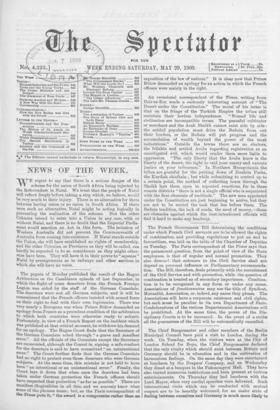The papers of Monday published the result of the Hague
Arbitration on the Casablanca episode of last September, in which the flight of some deserters from the French Foreign Legion was aided by the staff of the German Consulate. The deserters were not all German subjects, and it will be remembered that the French officers insisted with armed force OR their right to deal with their own legionaries. There was very nearly a European war when Prince Billow demanded an apology from France as a precedent condition of the arbitration to which both countries were otherwise ready to submit. Fortunately, in view of a French Report on the incident which was published at that critical moment, he withdrew his demand for an apology. The Hague Court finds that the Secretary of the German Consulate acted through " a grave and manifest error." All the officials of the Consulate except the Secretary are exonerated, although the Consul in signing a safe-conduct for the deserters is said to have committed " an unintentional error." The Court further finds that the German Consulate had no right to protect even those deserters who were German subjects. At the same time, this mistake is not held to have been " an intentional or an unintentional error." Finally, the Court lays it down that when once the deserters had been taken under German protection the French officers should have respected that protection " as far as possible." There are manifest illogicalities in all this, and we scarcely know what some of the phrases mean; but, as the Paris correspondent of the Times puts it, " the award is a compromise rather than an exposition of the law of nations." It is clear now that Prince Billow demanded an apology for an action in which the French officers were mainly in the right.






































